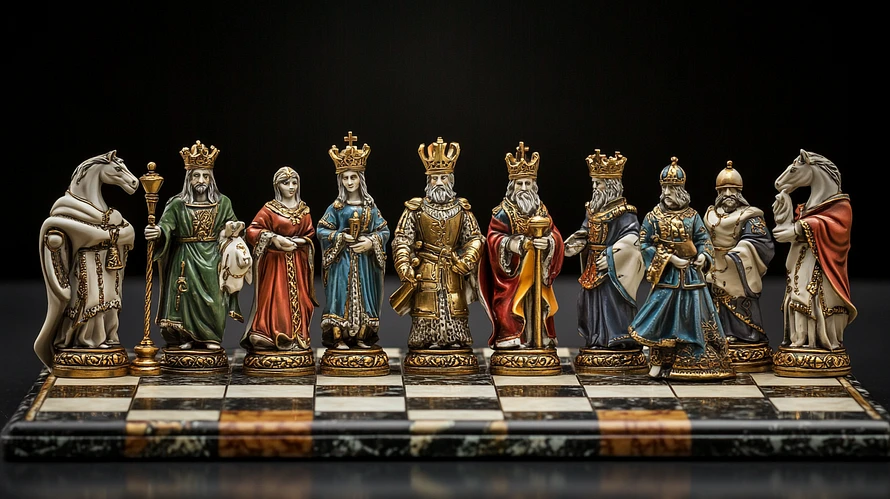Chess Origins and Evolution
Chess: A Timeless Game of Strategy
Chess is more than just a board game; it offers a window into human culture, history, and strategy spanning millennia. Chess has enchanted people across the globe, from its enigmatic beginnings to its present-day status as a phenomenon on a worldwide scale. Come with me as I explore its intriguing development.
Origins in Antiquity
The game of chess, formerly known as chaturanga, originated more than 1,500 years ago in northern India. Chaturanga, played on an 8x8 board, evolved into modern chess with the pawns, knights, bishops, and rooks reflecting the four divisions of the Indian army: infantry, cavalry, elephants, and chariots.
Once the game arrived in their country, the Persians adopted the name "Shatranj." Persian players honed the rules and introduced new concepts like "check" and "checkmate" (from the Persian phrase shah mat, meaning "the king is helpless").
Chess in the Islamic World
In the Muslim world, chess flourished after the Islamic conquest of Persia and became a highly esteemed intellectual activity. Experts in the field of chess used the game as a means of mental training, recording techniques, and annotating well-known games. The game arrived in Europe via Islamic Spain in the ninth century.
Medieval Europe and the Rise of Modern Chess
Throughout the Middle Ages, chess became wildly popular across Europe. By the 15th century, the game had changed drastically. The queen had become the strongest piece, reflecting the influence of strong female rulers in Europe at the time. The bishop had gained diagonal movement. New rules, like castling and pawn promotion, had come up to speed up the game.
The game of chess as we know it today emerged from these transformations. Ruy López de Segura and other chess greats from Spain and Italy were chess theory's lynchpins in the 16th century.
A Chess Revolution Begins
The introduction of organized tournaments in the nineteenth century was a watershed moment in the development of the game of chess. German chess master Adolf Anderssen won the first ever modern chess tournament in 1851, which took place in London.
Incorporating a new level of strategy, the chess clock drastically altered the game upon its introduction in 1883. Time management became an essential skill because players could no longer ponder indefinitely.
The Era of World Champions
Wilhelm Steinitz was the first official champion of the World Chess Championship, which started in 1886. Famous players like:
• Emile Lasker, who was champion for 27 years, rose to prominence at this time.
• José Raúl Capablanca, renowned for his fluid and instinctive play.
• Alexander Alekhine, who injected the game with inventiveness and violent ferocity.
Cold War-era bouts between Bobby Fischer (USA) and Boris Spassky (USSR) in 1972 brought chess to a worldwide spectacle and were among the heated rivalries that occurred in the twentieth century.
Chess in the Digital Age
Chess computers first appeared in the late 20th century. The 1997 match between Garry Kasparov, the reigning world champion, and IBM's Deep Blue, an AI program, ushered in a new age in the field.
Chess became a craze on a genuinely international scale because of the internet. Millions of people were able to play the game anytime, anywhere, thanks to platforms like Chess.com and Lichess.
Pop Culture and Contemporary Chess
These days, chess is more popular than ever before. Much to the delight of new fans, the 2020 Netflix series The Queen's Gambit revived the sport and brought forth a new wave of players. Chess influencers and grandmasters draw millions of people to their online streams, which combine entertainment with education.
While developments in artificial intelligence (AI) continually expand the frontiers of chess strategy, innovations such as Chess960 (a variant that randomly sets up the pieces) keep the game interesting.
The Enduring Appeal of Chess
Chess has stood the test of time; it’s more than a game—it’s a reflection of the human experience. It blends strategy, creativity, and psychology, offering endless possibilities on its 64 squares.
One thing that hasn't changed about chess is its capacity to captivate, inspire, and motivate players of all skill levels, from novices to grandmasters. Chess, whether played on a computer or a traditional wooden board, brings people together through a common appreciation of strategy and competitiveness.
What’s your next move? Dive into the timeless world of chess and discover why it’s captivated humanity for over a millennium.
